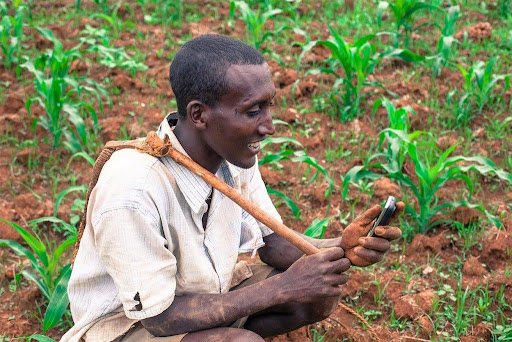Nigeria News
Nigeria Must Embrace E-extension And Digital Advisory Services To Boost Food Security

A farmer getting information on weeding timing based on Package of practice (PoP) of the out-growers project.
Author – Oluwafemi Royal Aliu
Contact – [email protected], +2348137365526
One of the numerous challenges of agricultural development in Nigeria is the inability of farmers to access vital information that can help boost their productivity and income such as relevant market information, local and timely agronomic and weather information, as well as information on how to access finance, agricultural technology, distribution, transport and storage systems and because Nigeria’s rural smallholder farmers with an average farm holding of 0.5Ha account for 90% of domestic agricultural production, the opportunity missed due to lack of access to vital information has plunged more than 72% Smallholder Farmers (SHF) to further live below the poverty line of USD 2 a day.
For emphasis sake, it is important to state that Smallholder farmers are critical to the cause of food security. Suffice to say that one-third of the world’s 7.4 billion people are smallholder farmers and their families produce nearly 70% of all consumed food on 60% of the world’s arable land, which means there are 2.5 billion people who live and work on 500 million smallholder farms each with less than 2 hectares. However, as stated earlier, the lack of quality market information to identify market opportunities, coordination among market actors and transparency, poor understanding of the lifecycle of contamination of crops from early-stage soil preparation to post-harvest handling continue to pose a greater challenge to food security.

A farmer getting information on weeding timing based on Package of practice (PoP) of the out-growers project.
Many of these farmers lack the know-how to practice sustainable agriculture practices such as integrated pest management, agroforestry and good agricultural practices (GAP) due to poor information access by the farmers. The inability of the farmers to embrace these practices consequently affects crop yield and overall productivity of their farmlands, thereby making Nigeria to face two key gaps in agriculture today: an inability to meet domestic food requirements and an inability to export at quality levels required for market success.
According to an Agriculture expert, Agricultural extension system in the country has been known for a long time to depend on the use of mass media and extension agents in information dissemination and getting of feedback, but this system has been marred with a lot of challenges especially in the area of “feedback” as majority of farmers depend on radio stations for their source of information without necessarily been able to express their understanding, experience or opinion about an issue that concerns them, while the extension agents where these farmers would have found solace, are faced with a lot of irregularities such as inadequate funds for extension services, inadequate number of extension agents, monitoring authorities are not able to get clear feedback on the quality of extension services being delivered in the villages etc.
The above paragraph essentially makes a good case for leveraging digital technologies to provide e-extension services and digital advisory services for farmers and as the most ubiquitous ICT platform in the developing world, mobile offers a unique opportunity to address this knowledge and information gap for farmers. Agricultural Value-added Services (Agri VAS) delivered over voice (e.g. IVR, helplines), text channels (SMS and USSD) and, increasingly, rich media (online content and apps), provide much-needed information on agricultural practices, market prices and marketplace services and local weather forecasts. Agri VAS can generate positive socio-economic change by transforming the mobile phone into a productivity tool for smallholder farmers. For the mobile industry, these services are a way to target the fast-growing rural segment more effectively (GSMA)
Organizations like Thrive Agric concerned about improving the livelihood of farmers in Nigeria to boost food security are using proprietary technology like Agricultural Operating System (AOS) to support the expansion of high-impact, digitally enabled services to farmers and extension officers across Nigeria.
This is a much-needed innovation and very necessary at a time like this when there is a major economic divestment into Agriculture by the Government of Nigeria and multiple private sector businesses.
Aliu Oluwafemi Royal (popularly known as Femi Royal) is an Agritech professional focused on the intersection of Technology, Finance and Sustainability. He has had working experience with Thrive Agric as an Agritech expert driving tech adoption with agripreneurs in Nigeria. He has been at the forefront of digital technology deployment like blockchain, artificial intelligence and remotely sensed technology in Nigeria.
